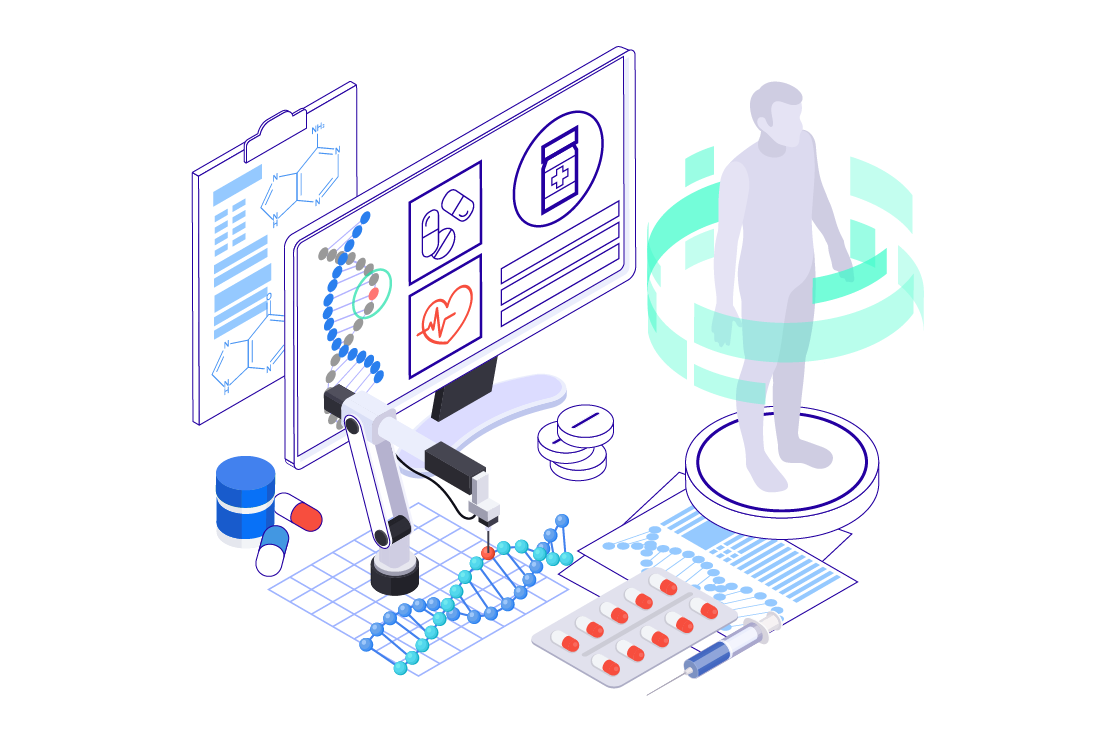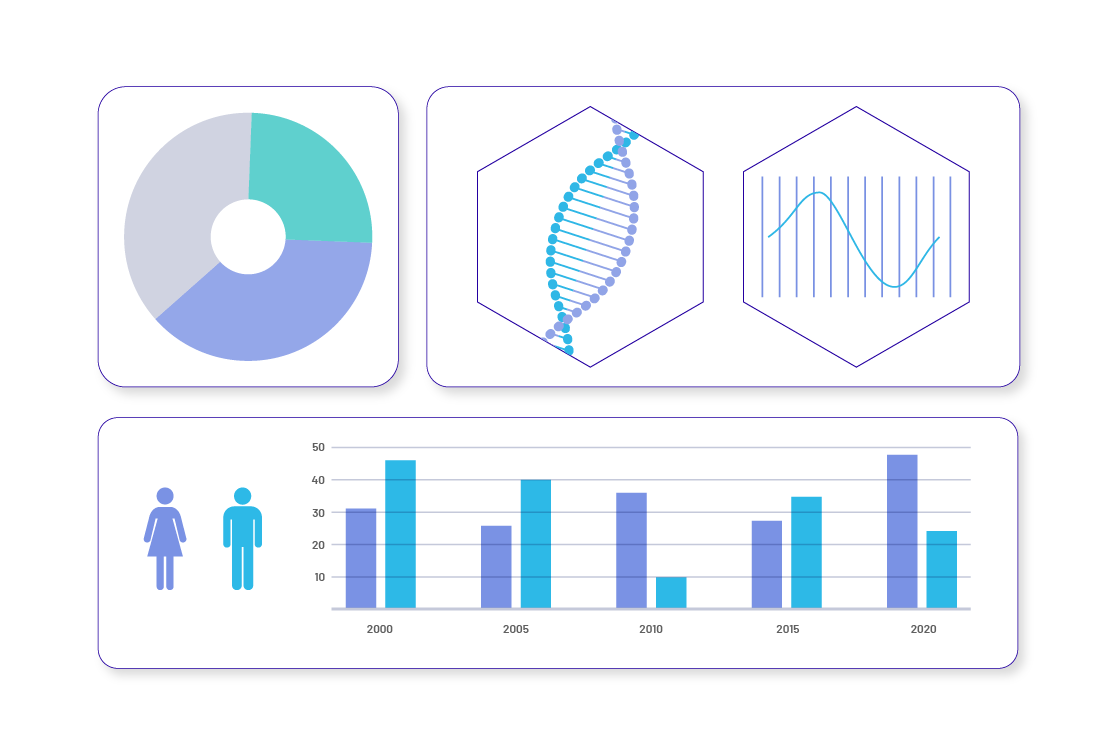AI in healthcare has become a board-level priority because it offers transformative potential for enhanced disease diagnosis, personalized treatment, and operational efficiency by analyzing large datasets to improve accuracy, reduce costs, and save time.
This strategic focus is driven by AI’s capacity to revolutionize patient care through tools for medical imaging, predictive analytics, and remote monitoring, ultimately leading to better health outcomes and more efficient healthcare systems.
Key challenges that boards must address include data quality, algorithmic bias, patient data privacy, and the need for appropriate guidelines and training to ensure safe and effective implementation.
Why is AI in healthcare when everything is based on human intervention?
Table of Contents
- Introduction: AI in Healthcare as a Board-Level Priority
- AI in Diagnostics & Early Disease Detection
- AI for Drug Discovery & Clinical Trials
- Operational Efficiency in Hospitals with AI
- Risks, Bias & Regulatory Compliance in Healthcare AI
- Case Studies: Pharma, Hospitals, InsurTech
- CXO Action Plan: Scaling AI Safely in Healthcare
- Conclusion
- FAQs
AI improves the overall diagnostic accuracy and speed. It incorporates medical data to recognize disease markers and patterns with high accuracy that often surpasses human experts.
AI also helps in developing individual treatment and medication plans, boosting the quality of personalized healthcare. This, in turn, allows healthcare professionals to focus on direct care.
Also, AI in healthcare helps speed up drug discovery and development through efficient analysis of large research databases & datasets. Going through traditional methods usually takes a lot of time and effort.
Key applications in healthcare
-
Medical imaging
-
Remote monitoring
-
Clinical decision support
-
Administrative automation
The introduction of AI requires significant capital investment in infrastructure, data governance, and talent.
As stewards of the organization, board members must be prepared to make these investments to ensure their institution remains competitive and relevant in the digital-first future.
AI in Diagnostics & Early Disease Detection
AI in diagnostics and early disease detection uses ai applications in medical to analyze medical data, such as imaging scans, electronic health records, and genetic information, to identify patterns and anomalies that may indicate disease.
This enables earlier, more accurate diagnoses of a range of conditions, including cancers, neurological disorders, and cardiovascular diseases, leading to more timely and personalized treatment and improved patient outcomes.
Let’s learn how AI is enhancing the diagnostic industry.
AI algorithms can analyze X-rays, CT scans, and MRIs to detect subtle signs of cancer or other conditions that might be missed by the human eye.
AI identifies complex patterns in vast datasets, including genetic information, lifestyle factors, and medical history, to predict a patient’s risk for developing certain diseases.
AI systems can integrate diverse data sources, such as lab results, genomic data, and patient symptoms, to facilitate a more comprehensive and accurate diagnosis.
A couple of examples to help decision makers of small & medium scale enterprises have a better understanding.
-
Cancer detection: AI tools can analyze mammograms and CT scans with high accuracy to detect early signs of breast and lung cancer.
-
Neurological disorders: AI is being developed to analyze brain scans and other data to identify early signs of cognitive decline, such as Alzheimer’s disease.
-
Cardiovascular diseases: Wearable AI-powered devices can monitor vital signs to detect risks of heart attacks and strokes, enabling preventative measures.
-
Chronic condition monitoring: AI can monitor chronic conditions like diabetes by analyzing real-time data, such as glucose levels, to provide personalized recommendations.
AI for Drug Discovery & Clinical Trials
AI significantly accelerates and streamlines drug discovery by identifying drug targets, designing molecules, and predicting drug properties through advanced data analysis.
This integration reduces costs and timelines, and increases the success rate of bringing new, more effective, and personalized medicines to market, though challenges in data quality, ethical considerations, and regulatory frameworks must still be addressed.

AI algorithms analyze large biological and chemical datasets to pinpoint relevant disease targets, such as proteins, and identify associated drug candidates. Models predict how a drug moves through the body and how it affects the body along with toxicity, helping to prioritize promising candidates.
When it comes to clinical trials, AI optimizes trial designs by identifying patients that are more likely to respond to treatment, leading to more targeted trials.
Recommended Readings:
- AI in Customer Support: How It Is Reshaping Customer Experience in 2025
- Leverage Generative AI for Businesses: How CXOs Can Implement Snowflake, Gen AI, & No-Code Agents
- AI App Development with Snowflake: Understanding the Enterprise Shift to AI-Powered Applications
- Generative AI & Snowflake: How it is Driving the No-Code AI Future?
Operational Efficiency in Hospitals with AI
AI automates all repetitive tasks such as billing, patient record management, and consultation scheduling. Automation also decreases human errors in the admin processes. Resource management has vastly improved with the use of artificial intelligence. The AI tools evaluate large amounts of data to cater for real-time insights so that management can take better and more informed decisions.
By enhancing overall efficiency and decreasing manual labor, AI in healthcare greatly contributes to significant cost reductions and improved financial margins. Plus, it alleviates staff burnout, allowing healthcare professionals more time for patient interaction.
Risks, Bias & Regulatory Compliance in Healthcare AI
Most healthcare leaders are aware of the different risks related to operational, clinical, and compliance. Algorithm prejudice is what can hamper all three, exposing organizations to various regulatory concerns, resulting in degrading patient care.
AI systems are based on data, and healthcare data is no different. Inequalities in diagnosis, treatment, and outcomes are compiled into the databases. If left unchecked, the AI models get trained on these inequalities and then end up replicating the same, even increasing them by several folds.
Now imagine an ai in the medical system that predicts patients who are most likely to miss appointments. If the training data reflects biased data, the system might deprioritize outreach or follow-up for those patients.
Case Studies: Pharma, Hospitals, InsurTech
Digital Health & EHRs: A study by the National Institutes of Health (NIH) showed that the introduction of electronic health records (EHRs) and patient portals improved physician compliance with guidelines, reduced duplicate tests, and enhanced patient satisfaction.
Cloud Migration: Deloitte detailed a hospital’s transition to a cloud-driven organization to simplify IT and streamline business processes, requiring a thorough inventory and analysis of its existing mainframe assets.
Value-Based Care: The American Medical Association (AMA) featured a case study of Hattiesburg Clinic, showcasing how technology adoption and data-driven decision-making led to better clinical outcomes and patient experience in value-based care models.
Blockchain & IoMT: Research explored the use of blockchain and Internet of Medical Things (IoMT) to enhance the security of sensitive medical data and enable international patient information exchange, according to the National Institutes of Health (NIH).
Fraud Detection: A case study by C2S Technologies highlighted how healthcare fraud detection systems saved money by identifying non-existent patients and up-coded claims.
Legal & Regulatory: A precedent-setting case from Schwartz, Conroy & Hack, PC involved GEICO being forced to arbitrate fraud claims against chiropractors, showing the scrutiny health insurance companies place on healthcare providers.
CXO Action Plan: Scaling AI Safely in Healthcare
Scaling AI in healthcare requires a strategic, enterprise-wide action plan led by CXOs to address risks such as bias, patient privacy, and clinical error.

Phase 1: Appoint an oversight body of clinical, technical, legal, and ethical experts to align AI with strategy and risk management. Establish a system-wide AI policy with guidelines for use cases, data quality, bias mitigation, and transparency. Clearly assign accountability for AI outcomes.
Phase 2: Prioritize a cloud-native infrastructure to handle AI’s data and compute demands, with lifecycle management and performance monitoring. Enforce enterprise policies to train models on high-quality, representative, and unbiased data. Strengthen security with robust encryption and access controls. Use federated learning to train models on decentralized data while preserving patient privacy.
Phase 3: Start with pilot projects that have measurable goals, such as automating radiology image analysis for lung cancer detection. Use early wins to prove ROI and build momentum. Replace “black box” AI with documented model development, including data sources and bias mitigation. Deploy XAI tools to help clinicians understand AI recommendations.
Phase 4: Provide ongoing staff training on AI in healthcare capabilities, limits, and ethical implications. Foster trust by promoting healthy skepticism—AI should augment, not replace, human judgment. Encourage collaboration among data scientists, clinicians, ethicists, and patients to co-design solutions that are technically, clinically, and ethically sound.
Wrapping It Up
AI in medicine is no longer just a theoretical advantage, but it’s a strategic imperative for healthcare administrators. From claims processing and fraud detection to patient flow optimization, RCM enhancement, and risk compliance, intelligent automation is reshaping operational efficiencies.
Real-world examples such as Omega Healthcare’s 30% ROI and administrative cost savings of 15,000 hours per month speak to measurable impact. Yet, responsible ai applications in medical means combining technology with human oversight, ensuring fairness, accuracy, and compliance.
To navigate rising costs and staffing pressure, healthcare CXOs should rely on someone who can prioritize AI in high-impact areas like claims, RCM, and scheduling while ensuring robustness in compliance for trust and safety. BluEnt is one such AI development & consulting service provider who analyzes your business requirements and AI POCs carefully and delivers exactly what you are looking for.
FAQs
How does AI improve accuracy and speed in claims processing?AI automates data extraction, eligibility checks, code validation, and submission—drastically reducing claims turnaround and denials.
In what ways can AI detect fraud and manage denials proactively?AI uses pattern recognition and anomaly detection to flag duplicates or suspicious claims and assists in generating appeal drafts for denials.
Can AI help optimize patient flow and resources?Yes—AI aids in staff scheduling, bed allocation, and patient intake coordination, reducing bottlenecks and improving operational efficiency.
What sort of ROI can healthcare organizations expect from AI in revenue cycle management?Examples such as Omega Healthcare show up to 30% ROI and savings of 15,000 employee hours monthly through automation.
What are the main compliance risks when deploying AI in health admin?Risks include bias, inaccurate denials, and regulatory non-compliance; human oversight, transparency, and adherence to laws are essential.












 AI Algorithms for Business Decisions: How They Deliver Real Value & Growth for CXOs
AI Algorithms for Business Decisions: How They Deliver Real Value & Growth for CXOs  AI in Programming: Disruption, Evolution, and CXO Strategy
AI in Programming: Disruption, Evolution, and CXO Strategy  AI in Healthcare Administration: Cutting Costs & Boosting Efficiency
AI in Healthcare Administration: Cutting Costs & Boosting Efficiency  AI for Supply Chain Resilience & Optimization: Strategies for 2026 and Beyond
AI for Supply Chain Resilience & Optimization: Strategies for 2026 and Beyond 
